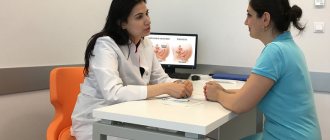We all know that we need to see a gynecologist regularly. But the high speed of modern life, lack of time and the need to be on time everywhere and everywhere forces many of us to postpone the visit until later. What are we risking and why is it better to postpone everything and make an appointment with a female doctor right now?
The statistics of scientists who study the incidence of gynecological diseases are harsh: in recent years, cases of endometriosis, menstrual irregularities and inflammatory diseases of the reproductive organs have become much more frequent. Women are increasingly faced with complications from sexually transmitted infections, discomfort during sexual activity and infertility.
Contrary to popular belief, regular visits to the gynecologist are necessary for all girls and women - even those who are still very young and not sexually active, who constantly use a condom during casual relationships, are 100% confident in their only partner and who have long experienced menopause. All representatives of the fair sex need to once and for all add to their list of important things to do a visit to the gynecologist at least twice a year. This is if nothing bothers you. If you have complaints or suspicions that not everything is in order in the area of women’s health, contact your gynecologist as soon as possible.
Is it possible to go to the gynecologist on the 6th day of menstruation? Is it possible to go to the gynecologist during menstruation?
The female reproductive organs are very vulnerable. Their physiology is such that the initial stages of the disease occur without severe symptoms or discomfort. This applies to sexually transmitted infections, erosions and inflammations, the consequences of which are very difficult to cope with. The precancerous condition can take years to manifest itself. The only way to detect them at an early stage is a timely gynecological examination and examination of smears for microflora and cytology.
Gynecologists consider days 7–15 of the female monthly cycle to be the most informative for examination. In this phase, the already formed dominant follicle with the egg grows and produces estradiol.
Practice has confirmed that it is enough to conduct such inspections once every six months, but not less frequently than annually. A visit to the gynecologist should be planned in advance and prepared for it. Many enterprises oblige their employees to undergo these procedures as a matter of routine. And here natural questions arise:
- Does it make sense to go for an examination during menstruation?
- When to go to the gynecologist after menstruation?
- Should I wait until the end of my period to see a doctor if I feel unwell?
How is a gynecological examination performed?
If a woman has no complaints or special indications for examination, regular examinations by a gynecologist are still necessary. In addition to revealing the hidden disease, they are useful for family planning, tracking age-related changes and simply for a woman’s confidence in her health. A better understanding of what a gynecological examination is, whether it can be planned before your period, during your period, or is it better to wait for it to end, will help you decide on the date of such a visit.
A full examination, which experts recommend every 6 months, includes:
- A survey during which the doctor fills out a form and notes what to pay special attention to. You need to answer questions clearly, without hesitation and frankly, even if they seem unethical. This is important information for a doctor.
- During an external examination, the doctor measures height, weight, blood pressure, and evaluates the nature of the hair on the woman’s body. Examines the condition of the glands, carefully examines the chest. Looks for condylomas, irritations, rashes or other pathological formations on the external genitals.
- This is followed by a visual inspection of the vaginal walls and cervix. A gynecological speculum is inserted into the body and with its help the doctor visually assesses the condition of the walls, mucous membrane and the presence of damage, inflammation, neoplasms and erosion.
- Next comes a bimanual examination. It is also performed in a gynecological chair. Its purpose is to determine the size, shape, location, mobility and tone of the internal female organs. To do this, the doctor gently probes them with one hand from inside the vagina, and with the other from outside the lower abdomen. If the girl has not yet had sexual intercourse, the examination is carried out through the rectum. Any painful sensations during the procedure must be reported immediately.
- Study of internal secretions. First, the doctor looks at their appearance, color and smell. Then he takes a smear for microflora analysis and cytological analysis. Microflora analysis determines the presence of infection, the development of fungal diseases and other disorders. Cytology analysis determines the condition of the cervix and allows you to recognize pathological changes in its cells at an early stage.
- If required, the doctor prescribes a pelvic ultrasound.
- The last stage of the examination is conclusions and consultation after receiving laboratory results. Therefore, you need to visit a gynecologist twice during a routine examination.
What to take with you
This issue is especially troubling for girls who are going for an examination for the first time. Each clinic has its own requirements. But if we generalize them, we get the following wishes:
- A diaper, towel or small sheet. They are needed so that you can lay the fabric under yourself on the gynecological chair.
- Disposable gynecological set. It includes: a mirror, devices in the form of scraping sticks, disposable gloves. It can be purchased at a pharmacy. However, this set is not always used, since many clinics practice with reusable instruments, which are processed in special devices.
- Condom. It is necessary for performing an ultrasound of the pelvic organs. Although in most medical institutions they are provided for use.
- Shoe covers or socks.
Is it possible to go to the gynecologist a week before your period? When to go to the gynecologist?
1-2 times a year, even without obvious complaints, you need to consult a doctor for a preventive examination. A simple examination, if necessary - smears, ultrasound and colposcopy, will help you prevent many diseases or detect them at an early stage and treat them in a timely manner. You should also contact a gynecologist in the following cases:
- Menstruation is painful, heavy and prolonged - more than 5-6 days.
- Irregular periods.
- Very short cycles.
- Intermenstrual bleeding.
- A few days before your period, pain in the lower abdomen, apathy, depression, weakness, and irritability appear.
- Burning and itching of the genitals.
- Irritation, roughness, rash, growths, and thickening in the labia area appeared.
- Pain during or after sexual intercourse.
- Bleeding or spotting after sexual intercourse.
- Pain appeared in the lower abdomen.
- Are you planning to start having sex?
- Problems with conception.
- Your period is late (even if you are not sexually active).
- There is a pregnancy or suspicion of it.
- There is a burning sensation or pain when urinating.
- Frequent urination.
- You are planning a pregnancy.
- Do you want to choose a contraceptive?
- There are changes in the mammary glands (discharge from the nipples, their retraction or deformation, breast tenderness, lumps, etc.).
There is an unpleasant odor and/or unusual discharge.
How often is testing needed?
Any healthy woman needs to visit a gynecologist 2 times a year. This is a necessary preventive measure for identifying the disease at an early stage. Reasons why you need to visit a gynecologist:
The gynecologist, through examination and tests, will determine the cause and prescribe the correct treatment. Menstruation is considered heavy if a tampon or pad needs to be changed more than once every two hours.
- Any irregularities in the monthly cycle. Delay may cause pregnancy.
- If the discharge is abundant, then the doctor, after doing the necessary research, will be able to determine the cause: Fibroma (benign tumor), polyps or other formations;
- Infection;
- Hormonal imbalances, which can lead to infertility. If diagnosed early, it can be treated effectively;
- Disruption of the monthly cycle may indicate improper functioning of the ovaries. Inflammatory processes affect the production of hormones by the ovaries.
- Regulate the menstrual cycle;
Is it possible to go to the gynecologist on the 7th day of the cycle? What do doctors think?
Is it possible to go to the gynecologist during menstruation? This is a question that worries women whose scheduled examination coincides with their period. Doctors advise that if the appointment is simply preventive without the presence of painful symptoms, then a visit to the women's office should be postponed. A gynecological examination reveals the presence of inflammation, erosive lesions, neoplasms and other abnormalities of the genital organs and tract. All this will become impossible to see and diagnose due to menstrual blood. Testing during menstruation may give false and false positive results.
The period of critical days cannot be considered a good time for gynecological examination, ultrasound diagnostics, tests, vaginal smears. In addition to distorting the results, menstruation can cause discomfort to the woman and the doctor conducting the examination. Most doctors will not conduct an examination on critical days unless there is a compelling reason for this, and will schedule a second appointment after the bleeding has stopped.
The most suitable days recommended for visiting a specialist are considered to be 3-4 days after the complete end of menstruation (approximately 8-10 days of the cycle). During this period, menstrual bleeding is completely completed and cannot interfere with a full gynecological examination. Also favorable days to visit a gynecologist are approximately 22-26 days of the menstrual cycle. These recommendations apply only to routine preventive measures if the woman is not bothered by alarming symptoms associated with the reproductive system.
conclusions
Every doctor knows what a gynecologist can and cannot do at an appointment. Therefore, when you make an appointment with a specialist, you don’t have to worry - the doctor will not perform procedures that are harmful to the patient. But a woman herself can harm herself if she conceals events related to sexual and reproductive function. A doctor will not judge a woman if she had an abortion or suffered any disease. Gynecologists examine patients every day with a variety of problems, so it is impossible to surprise them.
ONLINE REGISTRATION at the DIANA clinic
You can sign up by calling the toll-free phone number 8-800-707-15-60 or filling out the contact form. In this case, we will contact you ourselves.
If you find an error, please select a piece of text and press Ctrl+Enter
How to be examined by a gynecologist during menstruation. On what days should you visit a gynecologist?
The standard schedule for undergoing a preventive examination by a gynecologist is once every 6-12 months. But subject to the complete absence of complaints about the condition and function of the organs of the reproductive system.
If a woman has recently terminated a pregnancy, she should visit the doctor after 2 weeks. This factor does not depend on whether she had an instrumental, aspiration or medication abortion. Within 2 weeks, epithelialization of the site of attachment of the fertilized egg to the wall of the uterus occurs - thanks to examination on the chair and ultrasound, you can assess the completeness of tissue healing. But you need to see a doctor after 2 weeks only if the recovery process after the abortion proceeds without complications.
If after termination of pregnancy your general health has deteriorated significantly, you should immediately go to the doctor or call an ambulance.
If your period is late, you should visit a doctor, counting 14 days from the date of the expected date of menstruation. It is possible that the failure is a consequence of overwork, stress, or an acute respiratory viral infection.
The optimal time to visit a gynecologist is the initial phase of the menstrual cycle: regardless of its duration, the first 7-10 days after menstruation. At this time, the cervix has a texture favorable for examination, which will allow a correct assessment of the condition of the organ.
Gynecological examinations are not performed during menstruation. The only exceptions are cases when the patient is taken to the hospital department urgently. For example, with suspected damage to the genitourinary system. In this case, the doctor will have to differentiate between periods and vaginal bleeding caused by an ectopic pregnancy, ovarian rupture, or other conditions.









